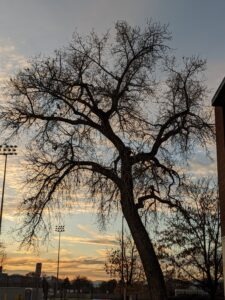“Poets are the canaries in the world’s coal mines,” Rabih Alameddine declares. (The Washington Post, December 26, 2023) He’s the Lebanese American author of An Unnecessary Woman and other award-winning novels.
Alameddine offers a selected list (an exhaustive one would be many pages) of poets arrested/exiled/tortured/killed for singing their songs. Authoritarian regimes have never liked poets, who tend to utter inconvenient truths. Leaders like Putin, Kim Jong Un, MBS (the ones trump admires) put poets in prison—or kill them.
Poetry is not an expression of the party line. It’s that time of night, lying in bed, thinking what you really think, making the private world public, that’s what the poet does.
— Allen Ginsberg.
Alameddine’s abbreviated list begins with Ovid, arrested and exiled by the Roman Empire, includes Ginsberg, and about fifty international poets. All those poets were guilty of writing what they really think—and making it public. The list ends with Mosab Abu Toha, Palestinian poet, arrested by Israel in November 2023 while fleeing with his family to southern Gaza.
Brief aside about another war: add the Russian poets Artyom Kamardin and Yegor Shtovba to the list, just sentenced to five and seven years in prison for reciting their poems against the war in Ukraine.
Before Mosab Abu Toha’s arrest, in October, poet Hiba Abu Nada, 32, was killed in her home by an Israeli airstrike and then, on December 7, poet Refaat Alareer, 44, was killed by an Israeli airstrike on his sister’s home, a strike which also killed his brother, his sister and her four children.
Mosab Abu Toha is fortunate, a well-known writer. His story of his own ordeal—he was beaten and injured—is in the January 1 & 8, 2024 New Yorker. He and his family are safely in Cairo now.
I already knew about the Gazan poet deaths because I’m a translator, connected to translator groups, among them those who translate from Arabic and other Middle Eastern languages, some of whom knew and translated these poets. Their mourning is personal.
It is possible to abhor what Hamas has done and still grieve for the 21,000 and counting Palestinian deaths, two-thirds of them women and children. It’s possible to want Hamas stopped and still mourn for children and poets.
Wilfred Owen, the English poet who died in 1918 in the “war to end all wars,” wrote: “My subject is War and the pity of War. The poetry is in the pity…All a poet can do today is to warn. That is why the true Poets must be truthful.”
Clips from TV coverage that burn in my mind:
One: A long line of Palestinians evacuating south as Israel told them to do, carrying small children, sacks of belongings. As the camera pans over them, one old man, his face grim, waves it away, says, “don’t bother: no one cares.”
Two: Hundreds of Israelis in the street, demanding a ceasefire, protesting the conduct of the war.
Three: In America, Jews wear black tee shirts that say, “Not in my Name,” block highways, besiege government buildings, demand an end to bombing.
It is not true that no one cares.
Four: Among Gazan refugees huddled near the Egyptian border, a Palestinian journalist says Hamas is distributing food. The old woman he’s interviewing shakes her finger at him, says, “that is not true. Hamas keeps much of it for themselves.”
Thank God for old people unafraid to speak their truth. Thank God for Jews who recognize an excessive response when they see one. Thank God for poets, who go on warning us, as they’ve always done.
Aladdemine quotes Refaat Alareer’s “If I Must Die,” which has been widely shared, published a month before he was killed:
If I must die,
you must live
to tell my story
to sell my things
to buy a piece of cloth
and some strings,
(make it white with a long tail)
so that a child, somewhere in Gaza
while looking heaven in the eye
awaiting his dad who left in a blaze—
and bid no one farewell
not even to his flesh
not even to himself—
sees the kite, my kite you made, flying up
above
and thinks for a moment an angel is there
bringing back love
If I must die
let it bring hope
let it be a tale.


Heartbreaking.
I’m so tired of crying. Not crying would be worse.
Many hugs, Teresa.
Great post.
How sad but true. A day does not go by when I think…..
But I would rather keep my thoughts to myself.
Thank the universe for the poets, the poets, who
bring beauty from darkness. They say what we cannot.
Thank you. Sylvia!
Much food for thought. Thanks, Pat.
Important directions here to various rabbit holes, most leading to some nitwit screeching “Off with their heads!” You know—those wannabe dictators who are really just playing-cards. Poetry reveals and dissects their mania, their arrogance, often by not bothering to mention them. Other times, only a raised middle finger will do….
We can’t lose any more truth tellers. They are few and far between these days!
Yes! And I should have mentioned journalists: how many of them have died in Gaza? Two more yesterday. Thanks, Kitty!